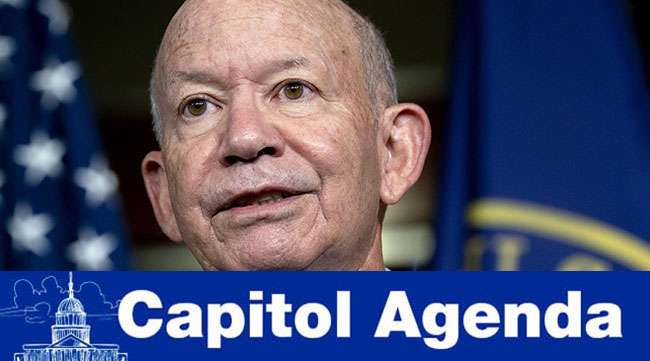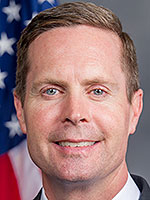Senior Reporter
US House Panel Considers Climate Change, Transit Budget Sept. 14

[Stay on top of transportation news: Get TTNews in your inbox.]
The transportation committee of the U.S. House of Representatives will have a big moment this week. On Sept. 14, the Democratic-led panel is scheduled to consider nearly $60 billion worth of climate change and transit mobility budget proposals that would constitute a significant piece of President Joe Biden’s domestic agenda.
Rep. Peter DeFazio (D-Ore.), the committee’s chairman, has emphasized a commitment to promote severe-weather-resilient infrastructure policies, as well as boosting funding for transit operations and high-speed rail nationwide.
According to the panel’s budget document, transportation policymakers will be asked to consider:

Mulero
• $10 billion for high-speed rail
• $2.5 billion for supply chain resilience and congestion reduction at ports
• $6 billion for “local surface transportation priorities,” which are expected to result in congressional earmarks
• $100 million to establish a traffic safety clearinghouse
• $8 million for a highly automated vehicle and mobility innovation entity.
The proposal also calls for further investments in minority neighborhoods and a greenhouse-gas reduction program meant for surface corridors.
These proposals, if adopted, would feed into House Democrats’ portion of the $3.5 trillion budget reconciliation legislation, which largely has been opposed by Republicans. DeFazio has insisted the budget reconciliation is an ideal legislative vehicle for advancing key transportation priorities. As he told The Washington Post last month: “Our transit systems in the United States of America, in our major cities and smaller cities, have a $108 billion backlog just to come up to a state of good repair, let alone give people more transit options.”
Reflecting further, the chairman said, “We used to be No. 1 for many years when the [President] Eisenhower plan started, and for decades after that.”
He added, “We can do better. We should do better. The federal government has been absent as a partner for decades. States are doing it on their own, but they can’t do it all on their own. Highways don’t end at state borders.
Amendment update by Transport Topics on Scribd
“So the federal government has to get back into partnership with the states, with the localities to get this done, and get it done in a way that’s meaningful for the United States of America; make us more competitive in the world economy; less dependent upon fossil fuels; less emitting in surface transportation.”
The Week Ahead (all times Eastern)
Sept. 14, 10 a.m.: The U.S. House Transportation and Infrastructure Committee considers its portion of the $3.5 trillion budget reconciliation process.
Sept. 15, 9:30 a.m.: The Senate Environment and Public Works Committee will consider nominations for U.S. Environmental Protection Agency and the Chemical Safety and Hazard Investigation Board.
Sept. 15, 1 p.m.: The Hill newspaper hosts “The Road to Zero-Emission Trucks: Fleets and Shippers.” Speakers include Rep. Garret Graves (R-La.); Sen. Ron Wyden (D-Ore.); Steven Moelk, project implementation manager for zero-emission delivery initiatives at Ikea; Russell Musgrove, managing director of global vehicles at FedEx Corp.; and Jimmy O’Dea, deputy director of trucks at Calstart.
Freight Corridor
Recent severe weather events prompted a response from the federal government.
Legislative Docket

Davis
Legislation that would establish a program at the U.S. Department of Energy to assist the trucking industry with the adoption of fuel-efficient technologies recently was introduced in the U.S. House of Representatives. Rep. Rodney Davis (R-Ill.), his caucus’ top surface transportation policymaker, recently unveiled the Supporting Trucking Efficiency and Emission Reductions (STEER) Act.
The bill aims to support the trucking industry with purchasing and installing fuel-saving technologies. Specifically, the legislation would set up a five-year, $500 million voucher program at the U.S. Department of Energy to cover certain costs associated with the adoption of fuel-efficient technologies for commercial motor vehicles.
 Buzz
Buzz

U.S. Senate Majority Leader Chuck Schumer (D-N.Y.) endorsed the White House’s call for emergency disaster relief meant to address the impact of recent severe weather events: “The Biden administration’s request for emergency disaster relief funding is just what is needed to help hard-hit communities all across the country. The Senate will begin working with Republicans to enact this emergency relief by the end of September to help communities recover quickly from the destruction caused by hurricanes, wildfires and flooding, including most recently Hurricane Ida.”
Favorite Video
Thie view from Wall Street.
Favorite Tweet
The USDOT family got a little bigger.
Chasten and I are beyond thankful for all the kind wishes since first sharing the news that we’re becoming parents. We are delighted to welcome Penelope Rose and Joseph August Buttigieg to our family. pic.twitter.com/kS89gb11Ax — Pete Buttigieg (@PeteButtigieg) September 4, 2021
The Last Word
The pandemic has fundamentally disrupted our supply chains which is impacting consumers, workers, and businesses across the country.
John Porcari, ports envoy to the Biden administration’s Task Force on Supply Chain Disruptions, on Aug. 27
We publish weekly when Congress is in session. E-mail emulero@ttnews.com with tips. Follow us @eugenemulero and @transporttopics.
Want more news? Listen to today's daily briefing below or go here for more info:



